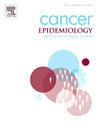Glycogen synthase kinase-3ß inhibitor use and prostate cancer incidence in Manitoba, Canada: A population-based nested case–control study
IF 2.4
3区 医学
Q3 ONCOLOGY
引用次数: 0
Abstract
Background
Little is known on the effect of glycogen synthase kinase-3ß inhibitors (GSK3Is), as a class, on prostate cancer (PC). We aimed to study this in the Canadian province of Manitoba, because mixed results have been reported on the effect of valproate.
Methods
We conducted a nested case-control study among cancer-free Manitobans with ≥ 5 years of medical history in which we matched all men 40 years or older diagnosed with PC between 2000 and 2018 (N = 11,189) on period, age, length of available drug information to cancer-free controls (N = 55,728). We used conditional logistic regression to analyze GSK3I use (lithium, valproate, olanzapine, famotidine). We repeated this analysis for bipolar disorder and for epilepsy, the main indications for GSK3I and performed period, dose, and duration analysis.
Results
Roughly the same proportion of cases and controls were ever-users of GSK3Is (4.0 % vs. 4.5 %). GSK3I use among the general population was associated with a reduced risk of PC (OR=0.81; 95 % CI 0.72–0.91). This effect was seen for both famotidine, 0.87 (0.76–1.00), and olanzapine, 0.72 (0.54–0.96). Valproate appeared to have a protective effect on PC for epilepsy patients (0.35, 0.12–0.99). None of the GSK3Is seem to affect PC risk in bipolar disorder patients.
Conclusion
Possible protection against PC from olanzapine or famotidine is not supported by a period, dose, or duration response and this effect could be due to chance and/or residual confounding. Valproate was possibly associated with a lower risk of PC in epilepsy patients, but a larger analysis would be needed to confirm that this association was not due to chance given the uncertainty in the period, dose, and duration analyses.
加拿大马尼托巴省糖原合成酶激酶3 β抑制剂的使用和前列腺癌发病率:一项基于人群的巢式病例对照研究
背景:糖原合成酶激酶3ß抑制剂(GSK3Is)作为一类药物对前列腺癌(PC)的作用知之甚少。我们的目的是在加拿大马尼托巴省研究这一问题,因为关于丙戊酸盐作用的报道结果不一。方法:我们在无癌症且病史≥ 5年的马尼托巴人中进行了一项巢式病例对照研究,我们将2000年至2018年期间诊断为PC的所有40岁及以上男性(N = 11189)与无癌症对照组(N = 55,728)在时期、年龄、可用药物信息长度方面进行匹配。我们使用条件logistic回归分析GSK3I的使用情况(锂、丙戊酸盐、奥氮平、法莫替丁)。我们对双相情感障碍和癫痫(GSK3I的主要适应症)重复了这一分析,并进行了周期、剂量和持续时间分析。结果:病例和对照组中曾经使用GSK3Is的比例大致相同(4.0 % vs. 4.5 %)。在普通人群中使用GSK3I与PC风险降低相关(OR=0.81;95 % ci 0.72-0.91)。法莫替丁为0.87(0.76-1.00),奥氮平为0.72(0.54-0.96)。丙戊酸对癫痫患者的PC有保护作用(0.35,0.12-0.99)。gsk3i似乎对双相情感障碍患者的PC风险没有影响。结论:奥氮平或法莫替丁对PC的可能保护作用没有时间、剂量或持续时间的支持,这种作用可能是由于偶然和/或残留的混杂因素。丙戊酸可能与癫痫患者较低的PC风险相关,但考虑到周期、剂量和持续时间分析的不确定性,需要更大规模的分析来证实这种关联不是偶然的。
本文章由计算机程序翻译,如有差异,请以英文原文为准。
求助全文
约1分钟内获得全文
求助全文
来源期刊

Cancer Epidemiology
医学-肿瘤学
CiteScore
4.50
自引率
3.80%
发文量
200
审稿时长
39 days
期刊介绍:
Cancer Epidemiology is dedicated to increasing understanding about cancer causes, prevention and control. The scope of the journal embraces all aspects of cancer epidemiology including:
• Descriptive epidemiology
• Studies of risk factors for disease initiation, development and prognosis
• Screening and early detection
• Prevention and control
• Methodological issues
The journal publishes original research articles (full length and short reports), systematic reviews and meta-analyses, editorials, commentaries and letters to the editor commenting on previously published research.
 求助内容:
求助内容: 应助结果提醒方式:
应助结果提醒方式:


